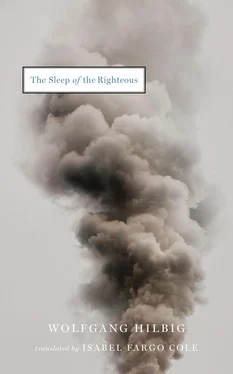I was quite mistaken; Gunsch talked the entire time, but only, it seemed, to himself. The old man muttered and snarled, he groused and griped without cease; from between the thin red lips, the only mobile part of his soot-smeared face, a relentless flood of words poured forth, now softer, now louder again and almost menacing. There was scarcely a word of German in it, and in moments of great difficulty I thought I caught the sort of Polish or Russian slurs I’d heard from my grandfather when he vented his rage at the world, the German-speaking world in particular.
After I’d spent half the shift ignoring them, his curses slowly but surely began to have an unpleasant effect on me. They weren’t aimed at me, at least I couldn’t imagine they were, but I was still part of the boiler room conditions which seemed to incur the old man’s rage. I felt a long-familiar ferment begin within me. When we returned to the boiler room after our silent lunch break, and I instantly broke into a sweat in the scalding air over the boiler’s iron cover plate, I noticed to my dismay that the old man was jabbering on.
Once and for all, would you shut up? I blurted out.
Gunsch paid no mind and cursed still louder, as though to drown out some sort of objections that barraged him from the past, from the filth and soot and barely breathable air of the present, or even from the future, which could never be anything but miserable. By chance, my gloved fist was clutching the red-hot iron hook used to open and shut the sliding doors to the boiler’s feed chute; for a few seconds I was at the point of ramming the heavy thing into the old man’s belly.
Shut up. . just shut up! I bellowed. The old man faltered and stared at me with bloodshot eyes. Astonished, he didn’t even seem to realize he’d been speaking. I saw that Gunsch dwelled in another reality; he was mad, constantly chattering with his ancestors or with ghosts of some kind. .
For a long time after that C. was bothered by his fit of temper. It was one more thing that he’d probably inherited from his grandfather, or learned by watching him. And it was not without its hazards: there you go knocking out someone’s teeth, or even knocking him dead, and then you’ve got to pay for it! No one will believe that you can’t help this rage, that it’s in your flesh and blood. And that this rage is made of memories that may not even be your own, premonitions or memories that were sunk within you without your really knowing them. Without your knowing it, a time bomb rests within you, ticking inside for years, for decades, and you never feel it. But someday it’ll explode and kill an innocent person! thought C. And you’re lucky if all you get is ten or twelve years in the slammer. . and maybe you’ll have to keep stoking in there, with a still older and lousier boiler, because those are your qualifications. .
Among his most unpleasant memories were certain scenes that had transpired between him and his grandfather; he had never spoken of them. They always brought bouts of perspiration; the mere thought almost inevitably made him break into a sweat. . when his grandfather worked up a sweat and his temper howled from within him, C. began sweating as well; in the blink of an eye he was speechless, choked by rage. Later, he told himself he’d merely wanted his grandfather’s rage-twisted face to assume a different, pitiful expression, but that was an excuse. He’d grabbed the old man — in his eighty-year-old madness reduced to little but railing and ranting — by the throat, with fists long used to the crushing weight of iron and steel. Some lucky angel must have intervened, not a moment too soon; of their own accord his fists released the old man’s neck.
When he thought about it, he was relieved that the old man was no longer alive; toward the end he’d persisted for days, indeed for weeks, in his rage, probably irked by nothing other than his own increasing infirmity. When it occurred to C. that the image of his grandfather’s last years might presage his own future he was overwhelmed with dread. — Russian or Polish curses had always played a role in the altercations C. recalled. In these tongues, he felt, they sounded especially irate or even hate-filled. And then he’d seemed to hear them again from Gunsch’s lips, and his temper, which he really felt was homicidal, had immediately flared up again.
In this host of curses there was one word that began with a guttural sound and escalated to a virtual eruption. . almost a spewing of flame, thought C. — He recalled that it sounded like: Holéra. . holéra! His grandfather had uttered it quite frequently, invariably during the most explosive rows in their tortuous family history; now it had shot from Gunsch’s gorge in just the same way, lobbed into some random distance, though you couldn’t tell for sure. It sounded malevolent; the word seemed to distill the sort of loathing that could mount only in the souls of eternally oppressed peoples or races. — C. had no idea what it meant, for he had always refused — and in this he resembled his mother — to learn even a few words of Polish or Russian. At some point he’d hit on the thought that it had to do with the name of a half-forgotten disease: cholera . And perhaps they used the word so often, my grandfather and Gunsch, because it resembled the German word Kohle , the term, that is, for the stuff at which they slaved each day, which filled their lungs with black deposits and forced black sweat from their pores. And then the ghastly name of the disease had become, for them, the quintessence of the clan that surrounded them: the clan was an insatiable plague sucking away their strength, wearing down their bones, transforming their hands into calloused paws that could never again be cleaned, drenching their gullets with tar and smoke so that nothing could free them up but floods of alcohol — and all that for the clan that ate them out of house and home. .
When he was in town, visiting his mother, all these things came back to mind. That at least served to justify — at least in his own eyes — the visits of his, which had recently grown more frequent. When he returned to Berlin afterward, the tumult of the city slid like a screen in front of the thoughts from which he felt he was compounded. — What ought he to write about, if not cholera . . he, C., who called himself a writer, albeit with a discomfort of which he seemed unable to rid himself? Ought he to write about Berlin, the city everyone else wrote about incessantly? Or should he write about his years navigating between East and West Germany, which had felt like a constant shifting back and forth between plague and cholera? He didn’t know, and he refused to know. He’d come from cholera, and he seemed to have survived it, and perhaps he could write about that. .
In Berlin, very rarely, he’d suddenly picture his mother, vegetating in the junk-stuffed, barely functioning flat he called a slum , to use a modern English expression for once. Growing older and older there, regularly falling asleep in the afternoon in front of the flickering, babbling television, as though no longer equal to the unwieldy mass of the consciousness hidden within her. And he knew that from the neighboring flats too, through the thin walls, the televisions could be heard: the breathless smarm of a host, the sycophantic applause of the audience, the perpetual, witless ooh-ooh of the mob, feigning enthusiasm over the sums of money or preposterous products flogged off on the never-abating game shows.
Amid that drivel she lay there on the red-brown couch, a thing that belonged on the junk heap, while in the yellow-tiled heating stove the spent coal crumbled to ash and cold seeped in through the crooked windows. She appeared to him then as a vessel of moldering memories that were undealt with, unspoken, that no one asked for, no one wanted to know about, and that began like unused coal to decompose.
Читать дальше












